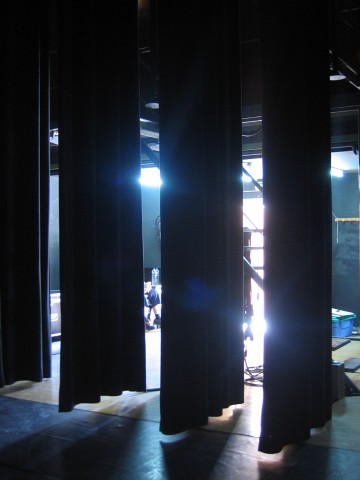
lunedì 10 dicembre 2007
PLE

mercoledì 28 novembre 2007
Sources jungle
Nowadays things are different. I rarely look for my sources in the library if I'm not doing a particularly important research. I generally try to find what I need in the Internet.
The first thing I do is typing one or some key words in a search engine and then I start skimming over the first proposals it gives me. It's definitely not an easy pass; there are often plenty of results. After that, I generally read or take a look at the passages under the URLS which contain the terms I'm looking for. If I think a website could be useful or interesting I click on its URL ( and if I recognize the website address as belonging to an important magazine, a reliable organization or if I know the author, yes, all these things would be further guarantees for me).
Most of the times, I understand what type of website I'm dealing with, just looking at its layout and at how information is presented. I chose the websites in which the presentation of the topic I'm interested in is particularly detailed and preferably enriched by some useful links. In this way I can always find more information if I need and obtain further material for possible connected examinations.
However, I admit I look for the date in which the site has been last updated in few occasions; if I like it, I generally pay attention just to the contents.
sabato 24 novembre 2007
Looking to each other - Youtube
Fortunately, this time wasn't the first time I found myself in touch with this character of the endless moors of the Internet, so I wasn't panic-stricken as usual.
http://www.youtube.com/ is one of the sites I proposed in our first E-tivity and as I wrote in that context, I think it can be very useful since everybody in the world can share videos and watch what others have decided to show. In this way we all can can watch and re-watch something we're interested in or find something nice just for fun. In addition, we can improve our listening skills and our knowledge of other cultures by using this tool, so it can be useful for languages students like us! On the contrary, I've never heard talking about TeacherTube...I just visited it and it's fantastic!
Obviously, there's also the other side of the coin...In Youtube everybody can find a lot of interesting things, but we all risk to meet something vulgar, offensive or simply stupid. A friend of mine showed me a video in which a person explained how to create a virus for computers...(there's no need to comment, I think...). Unfortunately, some people don't use Youtube properly so, as I said in my first post " Youtube is an opportunity in proportion to the intelligence of its users"...(I don't know if I'm quoting in the right way, but there's no problem, in my opinion: I'm not going to report myself) :)
Here there're the videos I chose:
I'm not a doctor but I WANNA work in a place like this...
and this is me last year...ha ha, I'm joking, but I'm really following an ice skating course (maybe with a bit less elegance...)
lunedì 19 novembre 2007
Listening to other worlds
1) http://pinkgeek.net/weblog3/rss.xml
2) http://eslpod.com/website/show_podcast.php?issue_id=467
3) http://www.voanews.com/english/customcf/podcastxml.cfm?id=3
sabato 17 novembre 2007
martedì 13 novembre 2007
Del.icio.us
We (or at least I) just discovered “del.icio.us”. It’s not a simple search engine; it’s a sort of search engine in “small format”. Thanks “del.icio.us” users aren’t destined to wander in the Internet looking for something; they will find just the websites other people have considered interesting.
I took a look at the websites chosen by my peers; there is something I really, really like.
I enjoyed Laura’s quotations website very much because I think that the use of quotations enriches a conversation and surely there are some that are very well-known and shared by a specific cultural and linguistic group. So, quotations may be a detail that brings a conversation to a higher level.
Alessandra proposes an online dictionary which also offers the right pronunciation of the words. It’s very useful, since it’s easy to use and if you have a doubt on pronunciation, you can solve it just with a click.
I liked Claudia Turolla’s special dictionary very much. It’s totally dedicated to slang expressions. Generally, nobody studies them at school, but they’re important, in my opinion, since native speakers always use them, especially young people.
However, a language has both formal and informal aspects. This is the reason why I also appreciated Claudia Trivellato’s suggetions about the drafting of commercial letters. The choice of appropriate words is fundamental to gain one’s ends and to be considered trustworthy.
Among Serena’s websites, I chose that which enables people to read American radios transcripts and listen to different audio files. It’s very interesting, because you can learn about American culture and society while you’re improving your listening skills. In this way you’ll probably have something to talk about besides your ability for understanding what native speakers say.
Thanks to “del.icio.us”, our searches in the Web are a bit easier now.
domenica 4 novembre 2007
Halloween

However, I believe that Halloween may be a great moment just for children. I don't hold with the general leaning towards the celebration of this day as it was part of our traditions. Watching a horror movie with some friends or doing something similar is enough, in my opinion. It isn't a crime, on the contrary, may be an acceptable compromise; a good idea to spend a nice night without exaggeration. You may say I'm too conservative, but I simply don't like this mixture of different traditions very much. Italian Halloween is the price of globalisation, but I strongly believe that variety in the world is a virtue, isn't it?
venerdì 2 novembre 2007
A world in a pocket (E-tivity 4)

Opening Bloglines is like holding your little world in your hands and managing it!
mercoledì 24 ottobre 2007
E-tivity 3
Well...maneging a blog may be a bit complicated or, at least, a bit stressful, since I tend to forget it is necessary to update it with new tasks and I'm generally scared of leaving a post with some unacceptable mistakes. This is the reason why I always read and re-read my messages trying to resolve the doubts that hover my mind whenever I write. However, it is surely useful, since I rarely write in English. I also like reading the posts of the other components of my group; I believe that this "peer collaboration" can teach many things. This blog activity also influences our language learning, especially as far as colloquial English is concerned, stressing sayings and a characteristic type of style. So, this activity pushes me to keep my skills up; unfortunately, my wits don't need so much time to go rusty and some little efforts are the right price for improving, in my opinion...
So, using the blog, we do an excellent writing exercise and we can improve our skills. However, there is also another aspect of this activity I've not mentioned yet and I'm afraid is unchangeable; the scare of writing something wrong, pushes me to avoid some stylistic and lexical choices I like but that may sound "unnatural", preferring other forms, that are less interesting, but safer.
mercoledì 17 ottobre 2007

A theatre stage is also similar to life; sometimes we all come on the scene and sometimes we all quit it to move to the backstage and wait for our turn...
These are two websites I frequently use:
